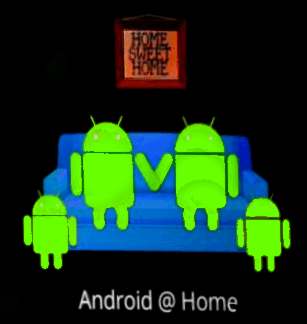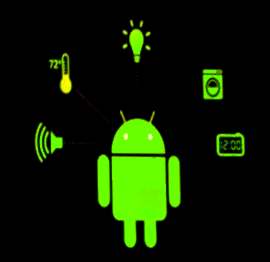| Android@Home - easy home automation? |
| Written by Harry Fairhead | |||
| Wednesday, 11 May 2011 | |||
|
Android@Home isn't ready yet and the details are a bit thin on the ground but it's a big idea as Google showed us at Google IO 2011. Your mobile phone is about to become even more essential with Google's announcement at Google IO 2011. Many users have already decided that their phone makes the ideal remote control for the TV and have downloaded an app to do the job but this is just the start. Android and the Internet of Things fit together really well. As your fridge and home security system start to connect to the Internet, Android will be there waiting to talk to them. The big idea is called Android@Home and while it isn't ready yet and the details are a bit thin on the ground Google demoed it at this year's Google IO.
If you want to do home automation at the moment then you can use a range of off-the-shelf devices like X10, but they all look like last century technology (which many of them are). Alternatively you can go DIY with an Arduino and Zigbee radio or similar but there are no real standards. Google's big, but fairly obvious idea, is to use the Android platform as a base for a home automation standard. At the moment the details are sketchy but it seems to involve using wireless to discover and connect to devices. The wireless connection can be WiFi but Google also has a new system that is similar to ZigBee, i.e. small, cheap and low power. The promise is that it will eventually be open sourced. However why Google feels the need to invent another wireless networking standard is a mystery. It also means that any existing Android devices are going to need a hardware add on to make them work as Android@Home devices - perhaps this is what the new ADK is all about?
A number of demo projects were shown at Google IO. A wireless speaker set called Project Tungsten syncs music around the house and streams from the new Google music service - not revolutionary but if part of a standard could become a low-cost commodity. The second demo was a remote controlled light bulb - again something of a yawn but... and this is the important point, Lighting Science Group plan to release LED light bulbs with Android@home built in. So you can upgrade you house to computer controlled lighting just by changing the light bulbs. Q) How many Androids does it take to change a light bulb? A) Just Android@Home Joking apart this could be the development that makes the home of the future the home of the present. With Android@Home providing a credible standard, home automation and the Internet of Things in general might move from being the preserve of the enthusiast to become simply the way things are done. Google plans to release the protocols for Android@Home later this year.
To be informed about new articles on I Programmer, sign up for our weekly newsletter, subscribe to the RSS feed and follow us on Twitter, Facebook or Linkedin.
Comments
or email your comment to: comments@i-programmer.info |
|||
| Last Updated ( Friday, 16 December 2016 ) |



